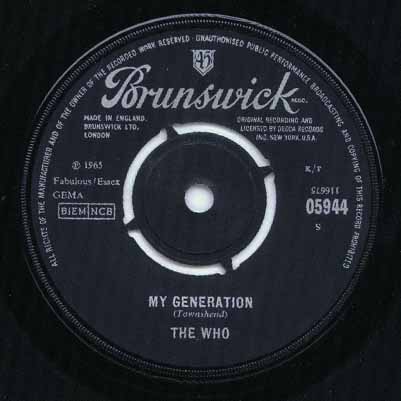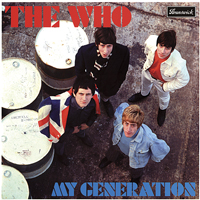| Notes and Quotes: "My Generation" |
  |
| Townshend: Our next single is really Pop Art . . . It’s anti middle-age, anti
boss-class, and anti young marrieds. . . . The big social revolution that
has taken place in the last five years is that youth, and not age, has
become important. (Melody Maker 1965) |
| Moon: Pete had written out the words and gave them to Roger in the studio.
He’d never seen them before . . . so when he read through them the first
time, he stuttered. . . . Kit [Lambert] said: "We leave it in, we leave
in the stuttering." When we realized what’d happened, it knocked us all
sideways. And it happened simply because Roger couldn’t read the words. (Rolling Stone 1972) |
| Townshend: We recorded the entire first album in six hours.... It wasn't our
club act, but we spent a week rehearsing. Kit shaped the songs, got rid
of the lousy verses, and coached Roger's vocals. Then we went in, laid
it on a plate, and Shel Talmy gave us our sound. I was only allowed into
the control room to hear playbacks. Glyn had told Shel I was interested
in recording. John, Roger, and Keith didn't get in. (Neill and Kent,
64) |
| Townshend: "We don’t mean it now . . . [but] we did mean it. We didn’t care
about ourselves or our future . . . even about one another. We were hoping
to screw the older generation, screw the Rockers, screw the Beatles, screw
the record buyers, and screw ourselves. We’ve been most successful on
that last account. We really didn’t want to end up jabbering in the pop
papers about our hang-ups: we wanted to die in plane crashes or get torn
to pieces by a crowd of screaming girls. It all began to change when Paul
sang "When I’m 64." (Melody Maker 1970) |
| Talmy [re feedback]:
Oh no, that was completely planned. Only recording it was a bitch because
of the tube equipment we were using. But if Pete could play it, I was
determined to get it on tape. So we set up three microphones to catch
the different echoes coming off the walls, and it came together pretty
quickly. (Perlich) |
| Talmy: Because I
was paying for the studio time and money was very tight, we went over
all the songs we'd be recording and then rehearsed them before going in
so I'd be certain of what I'd come out with. ... There was also a feeling
back then that if a band spent a long time in the studio they weren't
very good, which is just the opposite of the situation now. (Perlich) |
| Entwistle: I played that solo on a Fender Jazz Bass with tapewound strings
through a Marshall 50 watt amp and a four by twelve-inch cabinet. The
bass solos on the earlier takes were much more complicated and I played
them on a Danelectro medium scale bass which had a much more piano-like
sound. The trouble was that the strings I used on it were so thin that
I kept on breaking them. We recorded during the day and to finance the
sessions we were doing gigs nearly every night, but inevitably I would
break a string. The next day after one such gig, someone said we had to
record "My Generation" again but none of the music shops had
any replacement strings, so I had to go down to Marshall's and by a new
bass for £60. I ended up with three Danelectros, all with busted
strings! In the end, I busted my last string and there weren't anymore
in the country. So I thought, "Fuck it," and bought myself a
Fender Jazz Bass and a set of La Bella strings, and played the solo with
that. But it was a different sound and a simplified, slowed down version
of the solos on previous takes. (Cunningham 1998:
110) |
|
| "My Generation" is an
imitation of their live performances, which at this point in time
were increasingly violent. The recording features a number of radically
new ideas for a pop record. First, Entwhistle's bass solo must be
the first such featured in the middle of a sixties pop recording. |
| Second, while others had carefully
prepared "raves" at the ends of their recordings, the end of "My Generation"
(with Moon's full-kit drum roll, Townshend's guitar sound effects, and
the yells of band members) clearly gives the impression of a musical Bedlam. |
| Perlich, Tim. "Making the Who: How Producer Shel Talmy Helped Build a Mod Monster" In NowToronto. |
| You can view a live performance of "My Generation" at the Marquee Club in 1967 on YouTube. |
|
| Schedule |
18 March, 2012
|
